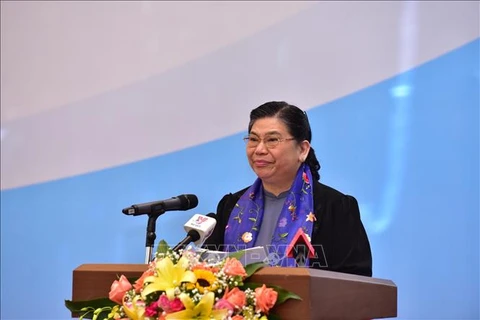 Delegates participate in the discussion at the workshop on the development of children under 6 years old. (Photo: VietnamPlus)
Delegates participate in the discussion at the workshop on the development of children under 6 years old. (Photo: VietnamPlus) Hanoi (VNA) - UNICEF experts have recommended Vietnam to focus on strengthening the supervision of the implementation of the Law on Children, and ensuring sufficient and equitable financial resources at both the central and provincial levels for children, especially those in their early years.
The recommendation was made at a workshop on UNICEF’S New National Action Plan on Early Childhood Care and Development for children under 6 years old organised by the National Assembly’s Committee for Culture and Education and the United Nations Children's Fund (UNICEF) in Hanoi on August 17.
Significant disparities in malnutrition rates
Every year, over 200,000 children under 5 years old in Vietnam suffer from severe acute malnutrition. What's more concerning is that 90% of these children do not receive treatment services.
In terms of education, there are also disparities between regions and ethnic groups. Only 37.8% of Khmer children and 47.6% of children in the Mekong Delta attend preschool, compared to 80.2% of those from the Kinh ethnic majority group. Nationwide, 22% of children aged 2-4 do not meet the comprehensive childhood development index.
Nguyen Thi Mai Thoa, a standing member of the National Assembly’s Committee for Culture and Education, said that compared to previous periods, the rates of malnutrition and child mortality have decreased, but not uniformly. In mountainous areas, the rates of malnutrition and child mortality are 3-4 times higher than those in the delta region.
 In mountainous areas, the rates of malnutrition and child mortality are 3-4 times higher than those in the delta region. (Photo: VietnamPlus)
In mountainous areas, the rates of malnutrition and child mortality are 3-4 times higher than those in the delta region. (Photo: VietnamPlus) Leveraging healthcare insurance resources
Speaking at the seminar, Vice Chairman of the National Assembly’s Committee for Culture and Education Ta Van Ha affirmed that the Party and the State of Vietnam always prioritise policies for children, creating the proper conditions for child development.
Ha stated that Vietnam's legal system and policies are continuously improving for children, in terms of intellect, physique, and aesthetics. The implementation of policies and laws on protection and development of children in recent times has achieved many positive and notable results. However, there are still many challenges and difficulties ahead due to the pandemic, global economic downturn, and other factors.
Lesley Miller, Deputy Representative of UNICEF in Vietnam, said the country is a pioneering nation both regionally and globally in the development of children as it has early ratified the Convention on the Rights of the Child.
Amid the challenges posed by the impact of the COVID-19 pandemic, global economic recession, natural disasters, and climate change, Vietnam, like many other countries, must make efforts to achieve Sustainable Development Goals (SDGs), particularly those related to children.
 UNICEF recommended Vietnam to establish sustainable financial mechanisms to ensure that all children suffering from acute malnutrition receive proper care. (Photo: VietnamPlus)
UNICEF recommended Vietnam to establish sustainable financial mechanisms to ensure that all children suffering from acute malnutrition receive proper care. (Photo: VietnamPlus) Providing recommendations, Miller suggested Vietnam review the implementation of the New National Action Plan on Early Childhood Care and Development and make necessary adjustments to achieve the set goals and indicators by 2025. Vietnam should also prepare for the upcoming 2026-2030 phase in line with its sustainable development agenda.
During the period of 2018-2022, expenditures on childcare and child protection accounted for a modest share of about 0.18-0.23% of the Government's social security budget. Hence, the NA should enhance the oversight role of elected bodies at all levels in planning and implementing policies concerning children's rights, especially in budget allocation and utilisation.
Furthermore, Vietnam needs to enhance its data system with essential indicators for child development, enable tracking progress and provide information for policy planning and implementation.
Regarding the issue of child malnutrition, she recommended the Government to establish sustainable financial mechanisms to ensure that all severely malnourished children receive treatment according to national standards, including leveraging health insurance resources following the amended Health Insurance Law./.























